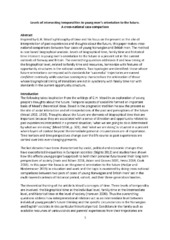Levels of intersecting temporalities in young men’s orientation to the future. A cross-national case comparison
Peer reviewed, Journal article
Accepted version
Permanent lenke
https://hdl.handle.net/1956/22469Utgivelsesdato
2019Metadata
Vis full innførselSamlinger
- Department of Sociology [437]
Originalversjon
https://doi.org/10.1177/0961463X19867569Sammendrag
Inspired by G.H. Mead’s philosophy of time and his focus on the present as the site of interpretation of past experiences and thoughts about the future, this paper makes cross-national comparisons between four cases of young Norwegian and British men. The method is case-based biographical analysis. Levels of biographical time, family time and historical time intersect in young men’s orientation to the future in a present set in the current contexts of Norway and Britain. The overarching question addresses if and how timing at the biographical level, related to family time and resources, harmonise with features of opportunity structures in the national contexts. Two typologies are identified: those whose future orientations correspond with standards for ‘successful’ trajectories are named confident continuity while cautious contingency characterises the orientation of those whose biographical timing of transitions is not in synchrony with family time nor with standards in the current opportunity structure.
